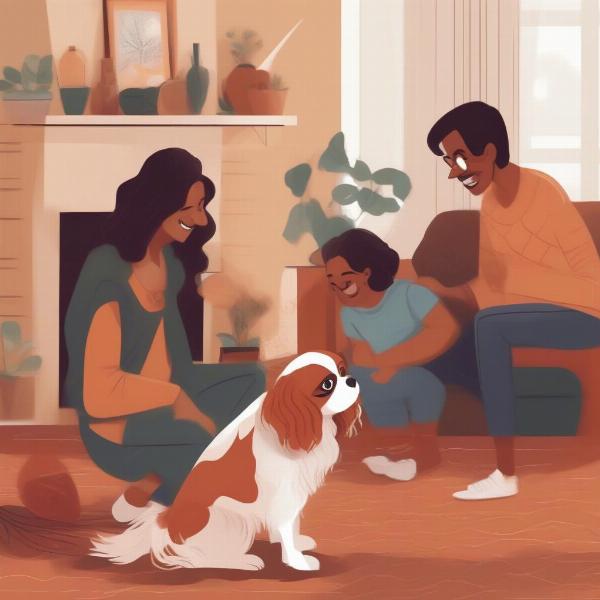Small bird dogs, known for their compact size and hunting instincts, make wonderful companions for a variety of lifestyles. Whether you live in a bustling city apartment or a sprawling countryside home, these breeds can adapt and thrive. This article will delve into the world of small bird dogs, exploring their unique characteristics, care requirements, and the joys they bring to their owners.
Unveiling the Charms of Small Bird Dogs
Small bird dogs are a diverse group, each breed possessing its own distinct personality and skill set. Their small stature makes them ideal for apartment living, as they don’t require vast spaces to roam. Despite their size, these dogs retain the keen hunting instincts of their larger counterparts, often displaying an energetic and playful nature. From the spirited Cocker Spaniel to the charming Cavalier King Charles Spaniel, there’s a small bird dog to suit every preference. Their intelligence also makes them relatively easy to train, though their inherent drive can sometimes present a challenge. Understanding their specific needs is key to fostering a happy and harmonious relationship with these lively companions.
Choosing the Right Small Bird Dog for You
Selecting a dog is a significant decision, and finding the perfect small bird dog requires careful consideration. Researching different breeds is crucial. Consider factors such as temperament, energy levels, grooming needs, and potential health concerns. Do you prefer a dog that’s constantly on the go or one that enjoys a more relaxed pace? Are you prepared for the grooming demands of a long-haired breed? Answering these questions will help you narrow down your choices and find a breed that aligns with your lifestyle and preferences.
Health and Care for Small Bird Dogs
Just like any dog, small bird dogs require regular veterinary check-ups, a balanced diet, and plenty of exercise. While generally healthy, some breeds are predisposed to certain health issues. Be sure to research breed-specific health concerns and discuss preventative measures with your veterinarian. Regular grooming is also essential, especially for long-haired breeds, to prevent matting and skin problems. Providing a stimulating environment with plenty of toys and opportunities for mental and physical engagement is crucial for their overall well-being.
Training and Socializing Your Small Bird Dog
Early socialization and training are vital for small bird dogs. Expose them to various sights, sounds, and experiences from a young age to help them develop into well-adjusted adults. Their intelligence makes them receptive to training, but their hunting instincts can sometimes lead to distractions. Positive reinforcement methods, such as praise and rewards, are generally most effective. Consistency and patience are key to achieving successful training outcomes.
Living with a Small Bird Dog: What to Expect
Living with a small bird dog can be a truly rewarding experience. They are affectionate, playful, and intelligent companions who bring joy to their owners’ lives. However, it’s important to be prepared for the responsibilities that come with dog ownership. Providing them with proper care, training, and attention will ensure a strong and lasting bond between you and your furry friend.
 Living with Small Bird Dogs
Living with Small Bird Dogs
Conclusion
Small bird dogs are a wonderful choice for individuals and families seeking a loving and lively companion. Their compact size, intelligence, and affectionate nature make them adaptable to various living situations. By understanding their unique needs and providing them with proper care and training, you can enjoy a fulfilling and enriching relationship with your small bird dog for years to come.
FAQ
- Are small bird dogs good with children? Many small bird dogs are known to be good with children, especially when properly socialized from a young age. However, supervision is always recommended.
- How much exercise do small bird dogs need? While their small size might suggest otherwise, small bird dogs still require a decent amount of exercise to stay healthy and happy. Daily walks and playtime are essential.
- Are small bird dogs easy to train? Small bird dogs are generally intelligent and eager to please, making them relatively easy to train. However, their hunting instincts can sometimes be a distraction, requiring patience and consistency.
- What are some common health issues in small bird dogs? Some small bird breeds are prone to certain health issues, such as hip dysplasia, eye problems, and heart conditions. Regular veterinary check-ups are important for early detection and treatment.
- Do small bird dogs bark a lot? Some small bird dogs can be prone to barking, especially if they are not properly trained or exercised. Early socialization and training can help mitigate excessive barking.
- Are small bird dogs good apartment dogs? Due to their smaller size, many small bird dogs adapt well to apartment living. However, they still need regular exercise and mental stimulation.
- What is the lifespan of a small bird dog? The lifespan of a small bird dog varies depending on the breed and individual health, but it typically ranges from 10 to 15 years.
ILM Dog is your trusted resource for all things dog-related. From breed selection to health care, training, and nutrition, we provide expert advice and resources to help you give your canine companion the best possible care. Our focus on small bird dogs includes insights into their specific needs and how to choose the right breed for your lifestyle. Contact us today to learn more! Email: [email protected], Phone: +44 20-3965-8624. ILM Dog is dedicated to helping you navigate the world of dog ownership with confidence and joy.